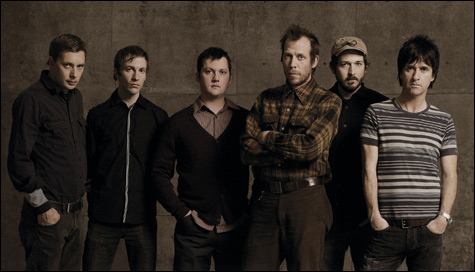
GOOD NEWS: We Were Dead Before the Ship Even Sank is the band’s most miraculous album yet simply because it’s so normal.
|
Like so many indie-rockers raised in the shadow of Northwestern clouds — or, for that matter, like so many artists raised in the shadow of the 20th century — Isaac Brock knows a thing or two about gray skies. But the Modest Mouse frontman also knows the somewhat forgotten art of backlighting those clouds with streaks of sunlight. So on the 2004 album Good News for People Who Love Bad News (Epic), Brock and his three mates included a song where they backed their car into a cop car and the cop just drove off because sometimes we just “Float On” past impending doom. It was a perfect(ly) Modest moment, romantic and dramatic but vocally unkempt, even a little unhinged, like life itself. Then something surprising happened: this temporary reprieve from the bad news sold like the Good News of the Bible.
Actually, “surprising” is an understatement — the cops didn’t just drive off, they dropped a bundle of unmarked bills from the bank robber they’d just caught. Now 31, Brock has been making music with Modest Mouse since he was 14 and living in a shed behind his folks’ trailer in the Seattle-area sticks. In 1997, the band released The Lonesome Crowded West (Up), “a high watermark of ’90s indie rock,” as Spin recently put it, and that led to yet another major-label bidding war for a Seattle-area indie outfit. In 2000, when everything “alt” had dried into a Puddle of Mudd, Modest Mouse finally released their major-label debut, The Moon and Antarctica (Epic), a sprawling, arty album whose commercial prospects were as dark as Brock’s writing. “I really wanted to have the chance to make just crazier albums, you know, much to the chagrin of Epic,” Brock said when I interviewed him during the The Moon and Antarctica tour. “Probably the next one is going to be really fucking odd, and probably completely unsellable, which suggests what kind of writing we’ve been doing lately. Maybe not completely unsellable, but I definitely haven’t been writing any Top 40 songs, you know? Thong! Thonga-thonga thong! I’m working on it.”
So he did. Four years later, “Float On” was released as the first single from Good News for People Who Love Bad News, and it helped make Modest Mouse that rare thing: new major-label rock stars. Yet as they racked up a stunning million and a half in sales, a couple of Grammy nominations, and licensing deals everywhere from an OC soundtrack to a Kidz Bop bowdlerization, Brock’s band were faring little better than that fabled band of Good News bringers from the first century. Shortly before recording Good News, long-time drummer Jeremiah Green suffered a breakdown and left the group. Shortly after its release, almost-as-long-time guitarist Dann Gallucci quit. Anyone who had even a passing acquaintance with the notoriously volatile Brock would have expected the singer/songwriter/guitarist to disavow his success much as Kurt Cobain had in the liner notes to Incesticide. The last song on Good News was even called “The Good Times Are Killing Me.” Then the too-bizarre-not-to-be-true news broke that Brock had teamed up for the next Modest Mouse album with guitarist Johnny Marr, musical compeer with Morrissey in the Smiths, those genre-bending, mid-’80s icons who gazed at the gray skies over Manchester and simply wept.
So, surprise surprise, with Brock-like, yin-yang irony, Modest Mouse’s new album, We Were Dead Before the Ship Even Sank (Epic), is the group’s most miraculous album yet because it’s so normal, fitting neatly and naturally into the artistic and commercial forefront of the current white-boy-guitar-music renaissance. And it does so while consolidating the band’s particular genre-and-generation-bending sound. It could consolidate Modest Mouse’s influence on future genres and generations, the way that Modest Mouse and Clap Your Hands Say Yeah! and Arcade Fire have been influenced by Talking Heads and the Pixies.
Dumb luck probably has something to do with that, as it does with most everything. But it’s about time we recognized that Brock’s volatility is a character trait he knows how to steer. And his surprise phone call to Johnny Marr’s “indie-rock-sized estate” helps prove it. In Brock’s estimation, former guitarist Gallucci was always something of a Johnny Marr imitator, and Brock wanted to see whether the original would balance his own guitar even better. The swooning melancholy Marr provided the Smiths might be part of that balance, but Brock’s real interest was sparked by Marr’s later session work, particularly with Talking Heads. And indeed the crisp, fractured, post-punk funk that Marr deployed with one of the style’s inventors defines much of We Were Dead. Nowhere is it more infectious than on the first single, “Dashboard.” Composed in a jam session during Marr’s initial 10-day tryout with the band, the song sealed the deal, and for good reason: it rocks harder than “Float On,” with more complex counterpoint and bridges (provided by programmed strings), yet it’s just as uplifting, with a complementary sentiment to boot: “It could have been, should have been worse than you’ll ever know.”